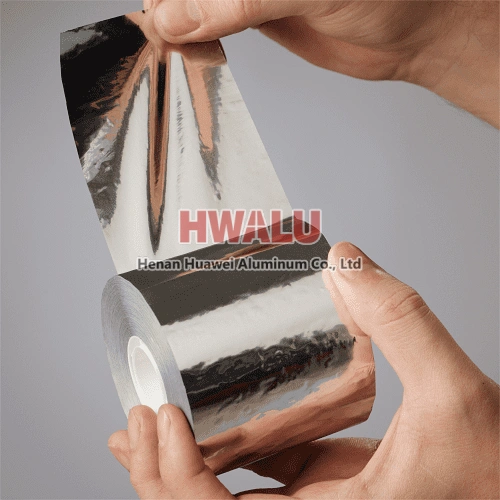Countries and regions where HWALU aluminum foil is sold well Asia: China, Japan, India, Korea, Malaysia, Vietnam, Indonesia, Thailand, Philippines, Singapore, etc. North America: United States, Canada, Mexico, etc. Europe: Germany, UK, France, Italy, Netherlands, Poland, Spain, Sweden, Switzerland, etc. Oceania: Australia, New Zealand, etc. Central and South America: Brazil, A ...
What is aluminum foil for sealing Aluminum foil for sealing is a kind of aluminum foil used for sealing packaging. It is usually composed of aluminum foil and plastic film and other materials, and has good sealing performance and fresh-keeping performance. Aluminum foil for sealing is widely used in the packaging of food, medicine, cosmetics, medical equipment and other industries. Aluminum foil for sealing i ...
What is aluminum foil for foil board Aluminum foil for foil board refers to a special type of aluminum foil used to make foil board, also known as "foil material". Foil sheets are commonly used to package food and pharmaceuticals to protect them from air, moisture, odours, light and other external elements. Aluminum foil for foil boards is usually thicker than regular aluminum foil, usually between 0.2-0.3 mm ...
What is aluminum foil paper? Aluminum foil paper, often referred to as aluminum foil, is a type of aluminum alloy foil. Aluminum foil paper is usually rolled into a very thin, flexible and highly ductile material that can be used in a variety of scenarios such as packaging, cooking, construction and electrical insulation. Is aluminum foil paper aluminum? Yes, aluminum foil is made of aluminum metal. It is ...
Aluminum foil alloys for food container lids Pure aluminum is a soft, light, and easy-to-process metal material with good corrosion resistance and thermal conductivity. It is often used to make the inner layer of food container lids to protect the freshness of food and prevent external contamination. In addition to pure aluminum, commonly used aluminum alloys include aluminum-silicon alloys, aluminum-magnesiu ...
The most commonly used aluminum foil alloy in food packaging applications is 8011. Aluminum alloy 8011 is a typical alloy of aluminum foil and has become the industry standard for food packaging due to its excellent properties. Here are some reasons why alloy 8011 is ideal for food packaging: Good Barrier Performance: The aluminum foil made of 8011 alloy can effectively block moisture, oxygen and light, helpin ...
Aluminum foil rolling produces plastic deformation under the conditions of roll-free rolling. At this time, the rolling mill frame is elastically deformed and the rolls are elastically flattened. When the thickness of the rolled piece reaches a smaller and more limited thickness h. When the rolling pressure has no effect, it is very difficult to make the rolled piece thinner. Usually two pieces of aluminum foi ...
As a metal material, aluminum foil is non-toxic, tasteless, has excellent electrical conductivity and light-shielding properties, extremely high moisture resistance, gas barrier properties, and its barrier performance is incomparable and irreplaceable by any other polymer materials and vapor-deposited films. of. Perhaps it is precisely because aluminum foil is a metal material completely different from plastic, i ...
https://www.youtube.com/watch?v=ZR_JvbVongU The shocking statistics released by the National Center for Cardiovascular Diseases suggest that China has the highest occurrence of sudden cardiac deaths (SCD) in the world, accounting for over 544,000 deaths annually. That is to say, SCDs occur at a rate of 1,500 people/day or one person/minute in China. According to David Jin, general manager of Henan Huawei Alumi ...
Have you ever eaten grilled fish or sixty-six, and you must have seen this tin foil, but have you seen this thing used in indoor spaces? That's right it's called decorative foil (decorative tin foil). Generally, it can be used on walls, top cabinets, or art installations. Aluminum foil (tinfoil paper) can be kneaded out of wrinkles, resulting in a very unique and abstract reflective texture, and the appeara ...
Aluminum foil is often used in our daily life, especially when we use microwave oven to heat food quickly. Can aluminum foil be used in microwave oven? Is it safe to do this? Please pay attention to the difference of microwave oven function, because different function mode, its heating principle is completely different, and the utensils used are also different. Now the market in addition to the microwave oven ...






